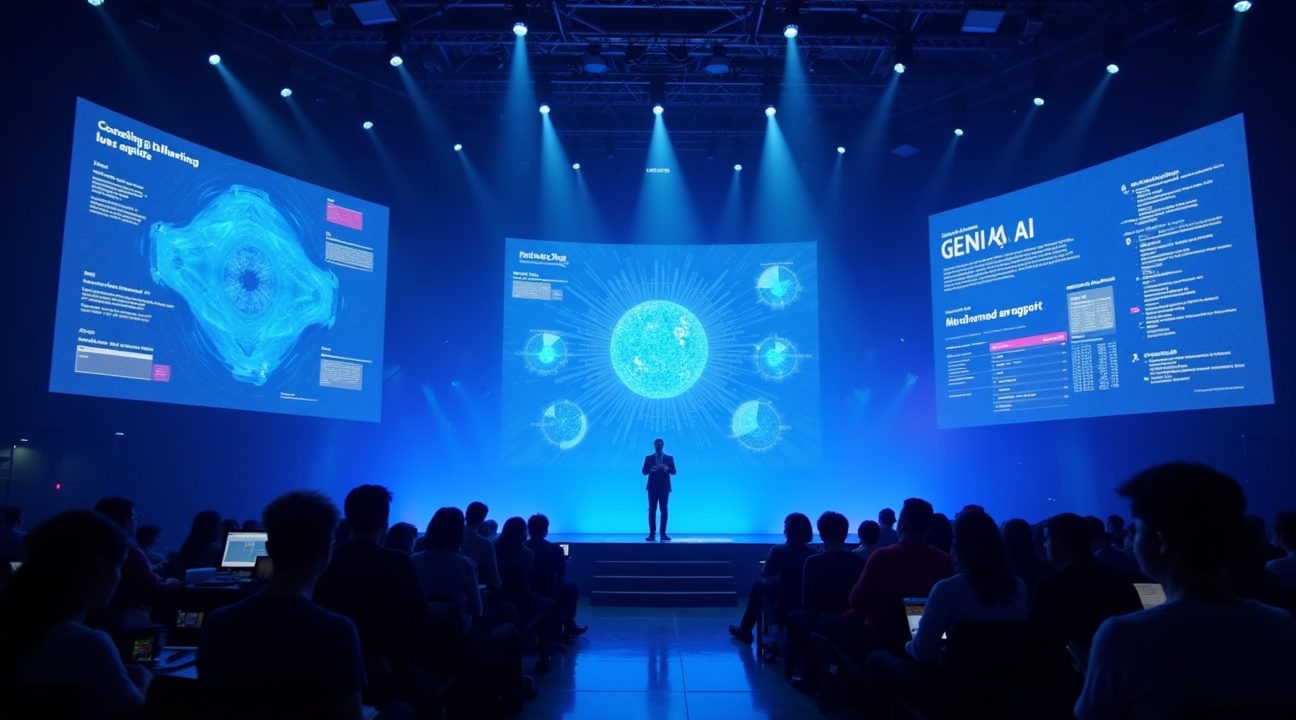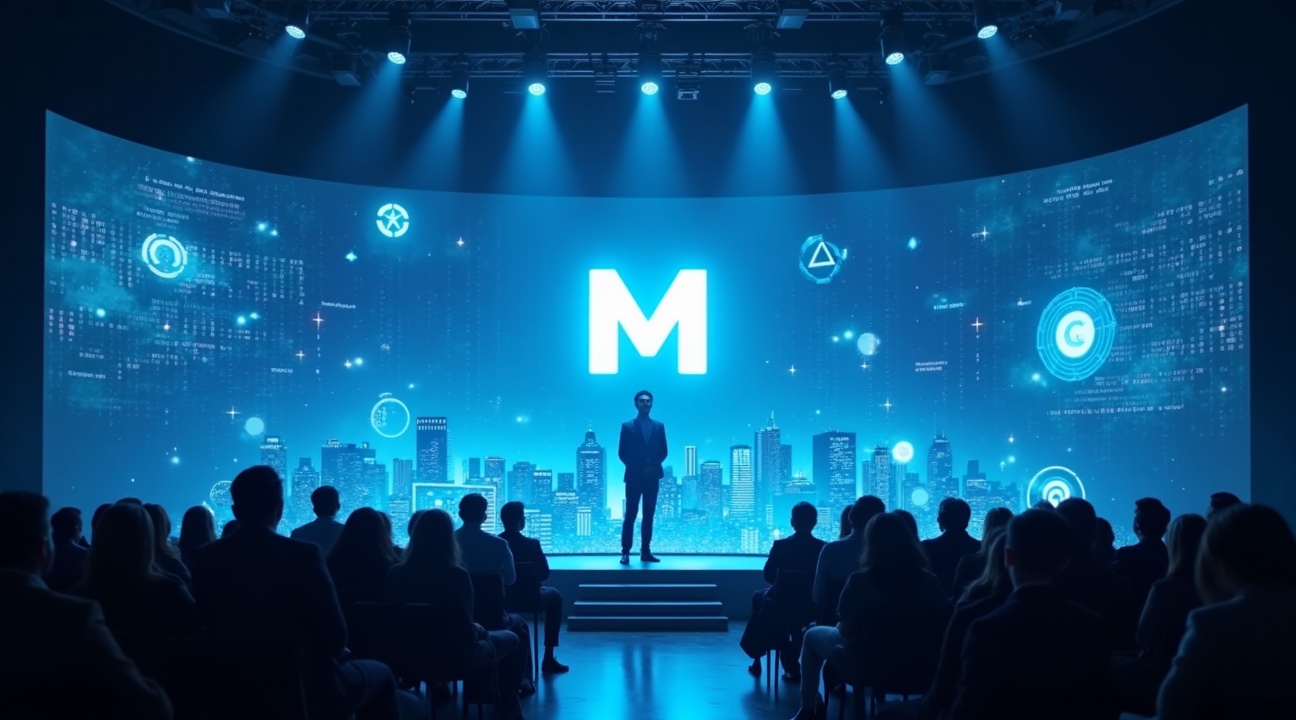Shengjia Zhao’s appointment as Chief Scientist and co-founder of Meta’s new Superintelligence Lab represents a strategic masterstroke that positions the company at the forefront of AGI development, directly challenging OpenAI and Google DeepMind through open-source innovation.
His exceptional track record includes co-creating breakthrough technologies like chain-of-thought prompting and playing instrumental roles in developing ChatGPT, GPT-4, and other groundbreaking AI systems during his tenure at OpenAI.
Key Takeaways
- Strategic Leadership Position: Zhao now works directly with CEO Mark Zuckerberg and Chief AI Officer Alexandr Wang in an elite leadership triangle, ensuring executive-level attention and resources for AGI research while eliminating bureaucratic bottlenecks.
- Open-Source AGI Vision: Unlike competitors who maintain proprietary control, Zhao leads Meta’s commitment to democratizing AGI development through transparency and collaboration, particularly advancing the Llama model series as industry benchmarks.
- Exceptional Technical Credentials: His contributions include co-creating chain-of-thought prompting, developing advanced synthetic data generation methods, and pioneering model alignment and bias mitigation strategies that have become industry standards.
- Massive Investment Backing: Meta has allocated $15 billion for AGI initiatives under Zhao’s guidance, encompassing talent recruitment, computing infrastructure, research partnerships, and specialized hardware development.
- Talent Magnet Effect: Zhao’s reputation and academic credibility serve as powerful recruiting tools, helping Meta attract top-tier researchers from premier institutions including OpenAI, DeepMind, Anthropic, and leading universities worldwide.
Meta’s Bold Move: Poaching OpenAI’s ChatGPT Co-Creator for New Superintelligence Lab
Meta executed a strategic masterstroke in July 2025 by appointing Shengjia Zhao as Chief Scientist and co-founder of their newly established Superintelligence Lab. This move positions the company at the forefront of the race toward Artificial General Intelligence, directly challenging competitors like OpenAI and Google DeepMind. Zhao’s appointment signals Meta’s commitment to accelerating AGI development through open-source innovation rather than proprietary closed systems.
The organizational structure places Zhao in an elite leadership triangle, working directly with CEO Mark Zuckerberg and Chief AI Officer Alexandr Wang, the former CEO of Scale AI. This configuration ensures that AGI research receives executive-level attention and resources, eliminating bureaucratic bottlenecks that often slow down breakthrough research initiatives. Zhao’s role extends beyond traditional research leadership, as he’s tasked with directing the lab’s entire scientific trajectory and centralizing Meta’s previously fragmented AGI efforts.
Strategic Focus on Llama and Open AGI Research
The Superintelligence Lab’s primary mission centers on advancing the Llama series of models, with Zhao overseeing their evolution from capable language models to potential AGI systems. His expertise in machine learning fundamentals and neural network architectures provides the technical foundation necessary for pushing these models beyond their current limitations. The lab’s approach emphasizes transparency and collaboration, aiming to open-source AGI research rather than keeping discoveries locked behind corporate walls.
Meta’s stock performance has reflected investor confidence in this strategic direction, particularly as the company demonstrates concrete progress in AI capabilities. Zhao’s leadership brings credibility to Meta’s AGI ambitions, given his track record in developing foundational technologies that power conversational AI systems. The focus on open-source development differentiates Meta from competitors who maintain strict proprietary control over their most advanced AI research.
The recruitment strategy under Zhao’s guidance represents an aggressive talent acquisition campaign targeting researchers from premier institutions including OpenAI, DeepMind, Anthropic, Apple, FAIR, and GenAI companies. This approach aims to consolidate the brightest minds in AI research under Meta’s banner, creating a concentration of expertise that could accelerate breakthrough discoveries. The company’s commitment to open research provides an attractive alternative for researchers who prefer collaborative environments over secretive corporate labs.
Zhao’s appointment comes at a critical juncture when Meta’s hardware initiatives require sophisticated AI integration to remain competitive. The Superintelligence Lab’s work will likely influence future VR and AR products, creating seamless human-AI interactions that enhance user experiences across Meta’s ecosystem. This integration strategy positions the company to compete not just in software AI capabilities but in creating complete AI-powered computing platforms.
The timing of this initiative coincides with intensifying competition in the AI space, as companies race to achieve AGI breakthroughs that could reshape entire industries. Meta’s recent product launches demonstrate the company’s willingness to challenge established players, and the Superintelligence Lab represents this philosophy applied to fundamental AI research. Zhao’s leadership provides the technical credibility needed to attract top talent and convince skeptics that Meta can compete with pure-play AI companies.
The lab’s emphasis on centralizing previously distributed AGI efforts reflects lessons learned from earlier AI research initiatives that lacked coordination and clear direction. By consolidating resources under Zhao’s scientific leadership, Meta creates a focused research environment capable of tackling the complex challenges inherent in AGI development. This organizational change suggests the company recognizes that achieving AGI requires sustained, coordinated effort rather than scattered research projects.
Zuckerberg’s recent aggressive business moves indicate a willingness to make bold bets on emerging technologies, and the Superintelligence Lab represents perhaps his most ambitious gambit yet. The success of this initiative could determine whether Meta emerges as an AI leader or remains primarily a social media company experimenting with advanced technologies. Zhao’s expertise provides the technical foundation necessary for this transformation, making his appointment a pivotal moment in Meta’s corporate evolution.
https://www.youtube.com/watch?v=813-DtTWVcGNRM
The AI Industry’s Talent War: Why Zhao is Considered a “LeBron James” Equivalent
The global competition for elite AI talent has reached unprecedented intensity, with industry leaders frequently comparing their search to finding basketball superstars. According to industry estimates, fewer than 1,000 individuals worldwide possess the specialized expertise required to build cutting-edge AI models that can compete at the highest level. Among this exclusive group, Shengjia Zhao stands out as a prime example of what companies like Meta consider essential for their long-term AI strategy.
Zhao’s reputation within AI circles reflects his commitment to rigorous academic research rather than flashy product announcements. Unlike many AI researchers who chase public recognition through high-profile product launches, he focuses on developing fundamental breakthroughs that advance the field’s theoretical foundations. This approach has earned him widespread respect among peers and positioned him as a thought leader in responsible AI development.
His research philosophy emphasizes safety, ethics, and the long-term implications of artificial intelligence systems. While other researchers rush to deploy consumer-facing applications, Zhao methodically examines the broader consequences of AI advancement. This careful, research-intensive methodology has made him a magnet for similarly-minded researchers who value substance over spectacle.
Meta’s Strategic Pivot Through Key Hires
Meta’s decision to bring Zhao aboard signals a fundamental shift in the company’s AI strategy. The hiring represents more than just acquiring another talented researcher; it demonstrates Meta’s commitment to foundational AI research and safety-first development practices. This strategic pivot reflects where Meta sees long-term value in AI leadership, moving beyond quick wins to sustainable competitive advantages.
The company’s approach to talent acquisition has evolved significantly under this new strategy. Several key factors make researchers like Zhao particularly valuable:
- Academic credibility that attracts other top-tier talent to join research teams
- Deep expertise in fundamental AI principles that drive breakthrough innovations
- Commitment to ethical development practices that align with regulatory expectations
- Ability to mentor and develop the next generation of AI researchers
- Focus on long-term research goals rather than short-term product pressures
Zhao’s presence at Meta has already begun attracting other distinguished researchers who share his commitment to rigorous, safety-conscious AI development. His reputation serves as a powerful recruiting tool, helping the company build research teams that prioritize quality over quantity. This network effect amplifies Meta’s ability to compete for the limited pool of truly exceptional AI talent.
The shift toward foundational research represents a calculated bet on the future of AI development. While competitors focus on immediate commercial applications, Meta’s investment in researchers like Zhao positions the company to lead in areas that will become increasingly critical as AI systems become more powerful and ubiquitous. Mark Zuckerberg’s leadership has recognized that sustainable AI leadership requires building strong theoretical foundations rather than just racing to market with the latest features.
Zhao’s understated approach to innovation contrasts sharply with the typical Silicon Valley emphasis on publicity and rapid iteration. His preference for thorough research and careful validation aligns with Meta’s growing recognition that responsible AI development requires patience and precision. This philosophical alignment makes him particularly valuable as Meta navigates increasing scrutiny from regulators and the public regarding AI safety and ethics.
The competition for talent of Zhao’s caliber has intensified as major tech companies recognize the strategic importance of foundational AI research. His hiring represents a significant victory for Meta in this talent war, demonstrating the company’s ability to attract researchers who prioritize academic excellence and long-term impact over immediate commercial success. This acquisition strengthens Meta’s position in the ongoing battle for AI supremacy while establishing a foundation for sustainable innovation in artificial intelligence.

The Mind Behind ChatGPT and GPT-4: Zhao’s Revolutionary Contributions at OpenAI
Shengjia Zhao’s three-year journey at OpenAI from 2022 to 2025 established him as one of the most influential minds in modern artificial intelligence development. During this critical period, he didn’t just contribute to some of the most groundbreaking AI systems ever created—he fundamentally shaped how these models think, learn, and interact with humans.
Architect of Next-Generation Language Models
Zhao’s fingerprints are all over the AI systems that have transformed how people interact with technology. His instrumental role in developing ChatGPT and GPT-4 positioned him at the epicenter of the AI revolution that has captured global attention. Beyond these flagship models, he spearheaded the design of derivative systems including GPT-4.1, o1, and o3, each representing significant leaps forward in AI capabilities.
The scope of Zhao’s technical contributions extends far beyond model architecture. He pioneered advanced synthetic data generation methods that became essential for training large language models at scale. His research into model alignment ensured these powerful systems remain helpful and safe, while his work on interpretability helps researchers understand how AI models make decisions. Perhaps most importantly, his efforts in mitigating bias addressed one of AI’s most pressing challenges.
- Advanced synthetic data generation techniques used in model training
- Alignment research to maintain safety and human-centric behavior
- Model interpretability for understanding decision-making processes
- Bias mitigation strategies addressing ethical and practical concerns
The Chain-of-Thought Revolution
One breakthrough stands out among Zhao’s many contributions: co-creating the chain-of-thought prompting technique. Introduced as part of the o1 model, this innovation fundamentally changed how AI systems approach complex reasoning tasks. The technique enables models to break down problems step-by-step, mimicking human analytical processes and dramatically improving performance on challenging queries.
This methodological advance has since gained widespread adoption across the AI industry. Companies building AI applications now routinely implement chain-of-thought prompting to enhance their systems’ reasoning capabilities. The technique’s influence extends beyond OpenAI, reshaping how developers approach AI problem-solving across multiple platforms and applications.
- Promotes step-by-step reasoning in complex AI tasks
- Widely adopted by AI developers across various industries
- Improved performance on cognitive and logic-intensive tasks
Zhao’s work at OpenAI coincided with Meta’s significant market gains and the broader AI boom that has redefined tech company valuations. While Mark Zuckerberg’s leadership has guided Meta through various challenges, bringing talent like Zhao into the fold represents a strategic move to bolster the company’s AI capabilities.
His departure from OpenAI and transition to Meta signals a new chapter where his expertise in language models, reasoning systems, and AI safety could drive Meta’s next wave of AI innovations. Given his track record of transforming theoretical concepts into practical breakthroughs, Zhao’s presence at Meta suggests the company is positioning itself for significant advances in AI development.
From Tsinghua to Stanford: The Academic Foundation of an AI Pioneer
I’ve consistently observed how strong academic foundations create exceptional leaders in technology, and Shengjia Zhao’s educational journey exemplifies this perfectly. His path began at Tsinghua University, where he earned his Bachelor’s degree and developed an unwavering discipline in foundational computer science principles. This prestigious institution provided him with the rigorous training that would become instrumental in his future success.
International Exposure and Research Excellence
Zhao’s academic experience expanded significantly during his exchange program at Rice University, which broadened his exposure to international research initiatives and diverse methodological approaches. This international perspective proved invaluable as he progressed to Stanford University, where he earned his PhD in Computer Science. Stanford’s environment sharpened his aptitude for deep research and cutting-edge AI theory, positioning him at the forefront of machine learning innovation.
Recognition and Validation Through Prestigious Awards
Zhao’s academic excellence didn’t go unnoticed, as evidenced by an impressive collection of prestigious accolades. These achievements demonstrate his consistent performance and growing influence in the field:
- Google Excellence Scholarship (2015)
- Qualcomm Innovation Fellowship (2019)
- JP Morgan PhD Fellowship (2019)
- ICLR 2022 Outstanding Paper Award
The ICLR 2022 Outstanding Paper Award particularly underscores his influence in the machine learning community and validates his research contributions at the highest level. This recognition came at a time when Meta stock soars reflected the company’s growing emphasis on AI capabilities.
His academic trajectory demonstrates how systematic excellence in research translates into practical leadership potential. Each fellowship and award built upon the previous achievement, creating a momentum that would eventually attract attention from major technology companies. The combination of theoretical depth from Stanford and practical international exposure created a unique skill set that aligns perfectly with Meta’s ambitious AI objectives.
This strong educational foundation established Zhao as someone capable of bridging theoretical research with practical applications, a quality that becomes increasingly valuable as companies like Meta continue to push the boundaries of artificial intelligence and machine learning technologies.
Meta’s Open-Source AGI Vision: How Zhao Plans to Challenge OpenAI and Google
Shengjia Zhao has positioned himself at the center of Meta’s ambitious strategy to dominate the AGI race through a fundamentally different approach than competitors. Unlike the closed-source models favored by OpenAI and Google, Zhao’s vision centers on open-source development that democratizes access to advanced AI capabilities while maintaining competitive superiority.
Llama Models as Industry Benchmarks
Under Zhao’s technical leadership, Meta has transformed its Llama model series into serious contenders for industry standards. These foundational models represent more than incremental improvements—they embody a strategic shift that challenges the proprietary approaches of competitors. Zhao’s team focuses on developing models that not only match the performance of closed systems but exceed them in specific domains while remaining freely accessible to researchers and developers.
The approach reflects Zhao’s belief that open-source development accelerates innovation through community collaboration. This strategy has already begun to pay dividends, with Llama models gaining adoption across academic institutions and commercial applications. The accessibility of these models creates a network effect that closed competitors like GPT-4 and Google’s Gemini cannot replicate, potentially giving Meta a sustainable advantage in the long term.
Massive Investment and Strategic Infrastructure
Meta’s commitment to Zhao’s vision extends beyond rhetoric into substantial financial backing. The company has allocated $15 billion specifically for Scale AI initiatives and broader AI infrastructure development. This investment encompasses several critical areas that position Meta for AGI leadership:
- Advanced computing infrastructure to support large-scale model training
- Aggressive talent recruitment programs targeting top AI researchers and engineers
- Research partnerships with leading academic institutions
- Development of specialized hardware optimized for AI workloads
- Creation of comprehensive AI safety frameworks and testing protocols
Zhao recognizes that achieving AGI requires more than just algorithmic breakthroughs—it demands a complete ecosystem of supporting technologies and human expertise. Meta’s stock performance reflects investor confidence in this comprehensive approach, with the market responding positively to the company’s clear AGI strategy.
The talent acquisition component of this strategy has proven particularly effective under Zhao’s influence. Meta has successfully recruited researchers from competitors and leading universities, building a team capable of executing on ambitious AGI timelines. This human capital advantage complements the technical infrastructure investments, creating a sustainable pipeline of innovation.
Zhao’s advocacy for transparency in AI development extends beyond philosophical preference to strategic calculation. By championing open-source approaches and sharing research findings, Meta positions itself as a responsible leader in AGI development while simultaneously building community support for its models. This approach contrasts sharply with the secretive development practices of OpenAI and Google, potentially giving Meta advantages in regulatory discussions and public perception.
The transparency strategy also creates defensive value against competitive threats. When research is openly shared, it becomes more difficult for competitors to claim proprietary advantages or create artificial scarcity around AI capabilities. Meta’s track record of challenging established players through open approaches has proven successful in other domains.
Zhao’s leadership has already begun to reshape competitive dynamics in the AI industry. Major companies are increasingly feeling pressure to justify their closed-source approaches as Meta demonstrates that open development doesn’t necessarily compromise competitive advantage. The success of Llama models has forced competitors to reconsider their strategies, with some beginning to explore more open approaches to AI development.
This positioning creates multiple pathways to victory for Meta in the AGI race. Even if competitors maintain technical leadership in specific areas, Meta’s open-source approach builds broader ecosystem support that can translate into market dominance. Zhao understands that AGI success isn’t just about creating the most capable model—it’s about creating the most widely adopted and integrated solution.

The Strategic Implications: What Zhao’s Appointment Means for the Future of AI
Meta’s Open-Source Gambit
Meta’s decision to bring Shengjia Zhao into the fold represents a calculated pivot that sets the company apart from its tech rivals. While competitors like OpenAI and Google guard their AI developments behind proprietary walls, Meta’s approach champions transparency and collaboration. Zhao’s background in open research perfectly aligns with this philosophy, positioning Meta to build an expansive ecosystem where developers, researchers, and institutions can contribute to and benefit from shared AI progress.
This strategic direction isn’t just about altruism—it’s smart business. Companies that embrace open-source models often see accelerated innovation as external contributors:
- Identify bugs
- Suggest improvements
- Develop complementary tools
Meta’s commitment to this approach, reinforced by Zhao’s appointment, could generate network effects that compound over time, creating value that closed systems simply can’t match.
The competitive landscape shifts dramatically when one major player chooses collaboration over control. Meta’s open-source strategy, now strengthened by Zhao’s expertise, may force competitors to reconsider their proprietary approaches or risk being left behind in a more democratized AI future.
Reshaping Industry Standards Through Ethical Leadership
Zhao brings more than technical expertise to Meta—he carries a values-driven vision for artificial general intelligence that emphasizes safety, ethics, and universal accessibility. His appointment signals Meta’s intention to lead not just in capability but in responsible development practices. This focus on ethical AI development comes at a critical time when public scrutiny of AI companies intensifies and regulatory frameworks begin to take shape.
The broader industry implications extend beyond Meta’s immediate plans. When a company with Meta’s market influence commits to ethical AI principles, it creates pressure for competitors to adopt similar standards. Zhao’s reputation for principled research could help establish new benchmarks for responsible AI development across the industry.
Meta’s talent acquisition strategy also intensifies the ongoing AI talent war. By securing researchers like Zhao who combine technical excellence with ethical leadership, Meta doesn’t just strengthen its own capabilities—it signals to other top-tier researchers that the company offers an environment where meaningful, responsible AI work can flourish. This positioning could attract additional breakthrough talent who prioritize both innovation and social responsibility.
The appointment fundamentally aligns Meta’s AI ambitions with long-term human interests, potentially creating a sustainable competitive advantage built on trust and collaboration rather than secrecy and control.

Sources:
NDTV: “From OpenAI To Meta: All You Need To Know About Chief Scientist Shengjia Zhao”
Times of India: “Shengjia Zhao education qualifications: How a Stanford PhD behind ChatGPT is now leading Meta’s superintelligence lab”; “Shengjia Zhao is leading Meta’s Superintelligence Lab”
TechCrunch: “Meta names Shengjia Zhao as chief scientist of AI superintelligence unit”
MLQ: “Meta forms AI powerhouse by appointing Shengjia Zhao as chief scientist”
Business Insider: “Meta Just Escalated the AI Talent War With OpenAI”
Board Stewardship: “Shengjia Zhao, GPT-4 Co-Creator, Takes Charge At Meta’s Superintelligence Lab”
Economic Times: “Who is Shengjia Zhao, OpenAI co-creator and now Meta’s new superintelligence chief”


